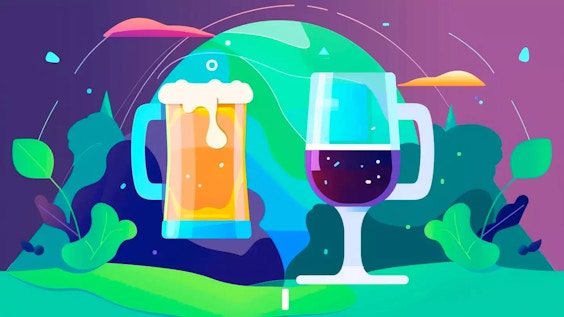
Are You at Risk of Developing Alcohol Abuse?
Last Updated: Fri, March 29, 2024Drinking is something that is widely socially acceptable, which can make it difficult to know if it has become a problem. Alcohol abuse is incredibly common and can easily go under the radar until it becomes a much bigger problem. The harsh reality is that alcohol abuse is a severe condition that can lead to life-altering consequences.
In this article, we will be discussing who is at risk of developing alcohol abuse and how to recognize this.
Who is at Risk of Developing Alcoholism?
Despite so much research being done on alcoholism and who it impacts the most, there is still a lot of mystery about why some people suffer from this more than others. There is no one-size-fits-all category alcoholics fit into, which can make it harder to predict who will develop alcohol abuse. However, there are some categories that can increase your chances of abusing alcohol.
Personality
Some research indicates that different personalities may be at a higher risk of abusing alcohol. People with more extroverted personalities may tend to be heavy drinkers as they enjoy social drinking. But more timid and shy personalities can also fall into this trap as a way of becoming more extroverted in social situations.
People with risk-taking personalities may also be more likely to suffer from substance abuse disorders as they are more inclined to push boundaries.
Family History
Things like genetics and family history can also come into play regarding alcohol abuse. How your family views alcohol and drinking will often impact you long into adulthood. As people become adults, they will often mirror the behaviors they saw within their family unit, including drinking behaviors.
Biological children of alcoholics are also much more likely to become alcoholics themselves. There are also particular genetics that can contribute to alcoholism, but the research still isn’t clear on why this is.
Environment
One of the dangers of drinking is that it is significantly impacted by environmental factors. For instance, some environments make it much easier to access alcohol, which can make it harder to consume wisely.
Other examples include your career and home life, which can either increase or decrease excess drinking. People with high-stress jobs or family troubles tend to rely more on alcohol as a coping mechanism.
Culture
An aspect of alcohol that is not talked about enough is the culture associated with drinking it. It comes as no surprise that cultures that celebrate drinking are more likely to produce people who suffer from alcohol abuse. The more socially acceptable drinking is, the easier it is for alcoholism to go unnoticed.
How the culture views alcohol can also make it difficult for people to admit they have a drinking problem and stop drinking. It can lead people who would otherwise avoid alcohol to drink so that they are part of the crowd.
Mental Health
Individuals who have mental health problems have a higher risk of developing alcoholism. This seems to be an especially high risk when it comes to people who have depression, social anxiety, and bipolar disorder.
Different types of mental health conditions can also change the way individuals behave and make decisions. For example, people with bipolar disorder may have a hard time making good decisions when it comes to drinking and how much they drink.
Recognizing Alcohol Abuse
Now that you know what factors can lead to alcohol abuse, you also need to be able to recognize the signs of alcoholism. Because drinking is widely acceptable, these signs are often brushed under the rug as being a part of drinking. But if you choose to drink, it is crucial that you understand what signs could be indicating that this is becoming an unhealthy and harmful habit.
Frequent Drinking
A very common indicator that you are starting to abuse alcohol is frequent drinking. Many people drink, but they only drink a small amount in certain situations. Some people have a glass of wine at night, a couple of beers over the weekend, or a drink or two when they go out with friends.
If you have started to drink more and more, this could be a sign that you are developing a problem. It is especially concerning if you are having to drink to get through the day.
Escalating Drinking
Those who have alcoholism will usually start to see an escalation in their drinking patterns. An example of this is if you are having to drink more and more to feel the desired buzz and numbness. You may also start to drink more potent forms of alcohol as your endurance goes up.
Another type of escalation is drinking excessively in social situations to the point that it becomes dangerous or reckless.
Inability to Stop
A clear indicator that your drinking is leaning towards alcoholism is if you are unable to stop yourself. People need to be able to stop drinking to avoid things like blacking out, dangerous situations, and alcohol intoxication. If you are no longer able to stop yourself, this can create many problems.
This often results in people having to drink throughout the day to satisfy that urge. You may even start drinking at work or school, causing interruptions to many aspects of your life.
Withdrawal Symptoms
Another clear indicator that your drinking has become a problem is if you experience withdrawal symptoms when you try to stop. The most common withdrawal symptoms are nausea, sweating, shaking, and generally feeling ill. If you start to experience withdrawal symptoms, this is a sign that your body has become dependent on alcohol to get through the day.
Conclusion
Alcohol abuse is a serious condition that many people suffer from without fully recognizing it. Unfortunately, there is no way of specifically saying who is most at risk of alcoholism since there are so many factors that come into play.
However, there are certain signs that you can look for that could indicate that your drinking has become a problem. If you believe that you are suffering from alcohol abuse, don’t be afraid to ask for help. A large percentage of people struggle with alcoholism, and you are not alone in this journey.
I Am Sober is a free app that helps you get some control back in your life.
Relevant articles

Beer Vs Wine: Which Addiction Is Worse?

5 Things to Look For in an Addiction Rehab Center For Alcoholics

How to Find the Right Therapist to Help With Alcohol Abuse

8 Lifestyle Changes to Make During Alcohol Addiction Recovery

How Do I Stop Evening Drinking?
